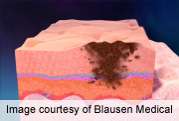Men aged 50 years or older are more likely to be diagnosed with invasive melanoma by a dermatologist than to detect it themselves; and they are less likely to seek a skin cancer screening due to a suspicious lesion, according to the results of two studies presented at the annual meeting of the American Academy of Dermatology, held from March 1 to 5 in Miami Beach.
(HealthDay)—Men aged 50 years or older are more likely to be diagnosed with invasive melanoma by a dermatologist than to detect it themselves; and they are less likely to seek a skin cancer screening due to a suspicious lesion, according to the results of two studies presented at the annual meeting of the American Academy of Dermatology, held from March 1 to 5 in Miami Beach.
Laura K. Ferris, M.D., from the University of Pittsburgh School of Medicine, and colleagues examined which patients detect their own melanomas before assessment by a dermatologist in a cohort of 167 patients diagnosed with melanoma. The researchers found that the patients discovered 60.5 percent of the melanomas, and that cases detected by the dermatologist were more likely in older patients. Men aged 50 years or older were more likely to be diagnosed with invasive melanoma by a dermatologist, compared with women in the same age group and younger men and women.
In a second study, to examine the impact of age and gender, Ferris and colleagues surveyed 478 adults who went for skin cancer screening by a dermatologist. The researchers found that men aged 50 years or older mainly sought a skin examination because they had had a previous diagnosis of skin cancer (64.6 percent). Compared with other patients, this group was less likely to seek a skin cancer screening because of a suspicious spot (11 versus 22.5 percent).
"Older men are most at risk for melanoma and are most likely to die due to a delayed diagnosis," Ferris said in a statement. "This should be a wake-up call to men over 50 and their loved ones."
More information:
Press Release
More Information
Health News Copyright © 2013 HealthDay. All rights reserved.




















